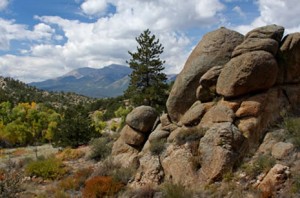by Eugene Buchanan
Published in 2007 by Fulcrum
ISBN 978-1-55591-608-4
Reviewed by Ed Quillen
In the summer of 1993, Eugene Buchanan and three fellow American floaters arrived at the Moscow airport, where they were supposed to meet André to run the Kalar River in Siberia. Except André was in Turkey with no firm return date, but he’d told his friend Boris, part of a Latvian river-running team, and Boris wanted them to join a trip down the rapids of the Bashkaus River, also in Siberia.
Getting to the put-in required three days on a crowded train, followed by a long ride in a truck with a radiator that resembled Old Faithful. And then it was time to assemble the gear — literally. The Latvians travel light with versatile, home-made equipment, and there’s no point in carrying around aluminum raft frames.
Instead, they chop down trees and build wooden frames for “catarafts,” and what follows is a long and challenging adventure.
I don’t have enough river knowledge to appreciate the finer points of how they maneuvered through the whitewater, but that doesn’t really matter. Buchanan (who spent a season guiding in Brown’s Canyon of the Arkansas) also recounts the history and lore of the territory, and has a keen eye for the social interactions.
Few of the Latvians have any English, and none of the Americans speaks Russian. They share river knowledge, but can generally express it only in action.
In the Russian back-country, they trade vodka for fresh-butchered mutton. Armed horsemen appear from time to time. The trip leader, Ramitch, handles such negotiations, and he emerges as “a man to ride the river with” — resourceful, courageous, but also cautious when necessary.
Calories are always a concern — they can’t get enough of them, and fish-eye soup and raw pork fat cubes are soon coveted.
Buchanan often muses about the two different social and economic systems, and whether they produce different kinds of people. The Latvians seem much more team-oriented and less individually competitive than the offspring of American capitalism.
“We’re beginning to appreciate the rituals in their lives. The Latvians have never had the choices that come with personal freedom and have learned instead to put the needs of the team ahead of the individual. This is evident on and off the river. Instead of getting to camp and unwinding, the keep their wet suits on and immediately set about tasks for the common good. There is no relaxing or worrying about personal affairs until team needs have been met. On a river trip back home, people often scatter to claim premium camp positions as soon as they touch the bank. Here, it’s the opposite. Wetsuits stay on until the fire is blazing and the benches are built. Even drinking is a ritual, requiring the raising of the official drinking flag. You don’t just pop open a can of beer and break out the horseshoes. Everything is as rigid as the frames holding our rafts together.”
This was a wonderful book, one that kept me reading and pondering what lay around the next bend of a remote river. No raft-trip book will ever be as good as Huckleberry Finn, but this one was a grand adventure, even for a guy whose idea of a fine river trip is the Salida West run down a placid part of the Arkansas.

